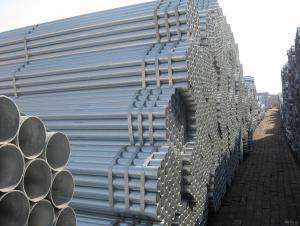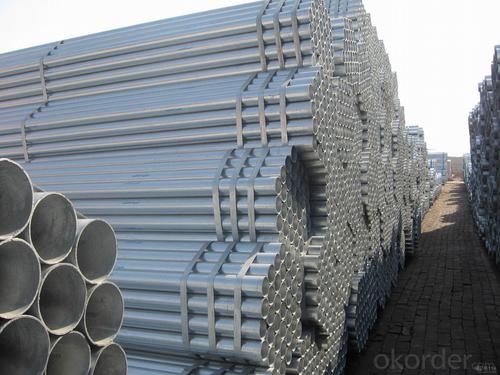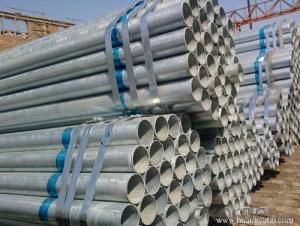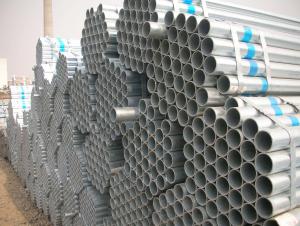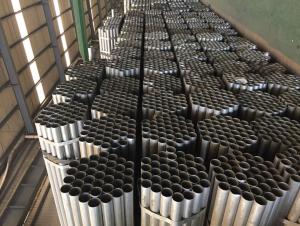Galvanized pipe America Standard ASTM A53 100g/200g hot dipped or pre-galvanized pipe
- Loading Port:
- Tianjin
- Payment Terms:
- TT or LC
- Min Order Qty:
- 40 m.t.
- Supply Capability:
- 9000 m.t./month
OKorder Service Pledge
OKorder Financial Service
You Might Also Like
1、Structure of Galvanized pipe America Standard ASTM A53 100g/200g hot dipped or pre-galvanized pipe:
The surface of Galvanized pipe America Standard ASTM A53 100g/200g hot dipped or pre-galvanized pipecan increase the corrosion resistance of the steel tube, prolong service life. Galvanized pipe is widely used, in addition to water, gas, oil and other general low pressure fluid pipelines. It is also used in the petroleum industry, especially for offshore oil field of oil well pipe and oil pipe, chemical, coking equipment of oil heater, condensation cooler, coal run oil exchanger tube, and trestle pile, the mine tunnel support frame tube.
2、Main Features of Galvanized pipe America Standard ASTM A53 100g/200g hot dipped or pre-galvanized pipe:
• High manufacturing accuracy with standard
• High strength and stable
• Good visual effect
• Reasonable price
• Small inertia resistance
• Strong heat dissipation ability
3、Galvanized pipe America Standard ASTM A53 100g/200g hot dipped or pre-galvanized pipe Specification:
Standard | GB, DIN, ASTM ASTM A106-2006, ASTM A53-2007 |
Grade | 10#-45#, 16Mn 10#, 20#, 45#, 16Mn |
Thickness | 1 - 33 mm |
Section Shape | Round |
Outer Diameter | 21 - 610mm |
Place of Origin | Tianjin, China (Mainland) |
Secondary Or Not | Non-secondary |
Application | Hydraulic Pipe |
Technique | Cold Drawn |
Certification | API |
Surface Treatment | factory state or painted black |
Special Pipe | API Pipe |
Alloy Or Not | Non-alloy |
Length | 5-12M |
Outer Diameter | 21.3-610mm |
Grade | 20#, 45#, Q345, API J55, API K55, API L80, API N80, API P110, A53B |
Standard | ASME, ASTM |
1) Material:20#(ASTM A 106/A53 GRB.API5LGRB,GB),45#,16Mn,10#.
2) Specification range:OD:21.3-610mm,WT:6-70mm,length:6-12m or according to the requirement of clients.
3) Excutive standards:GB,ASME API5L.ASTM A 106/A53,Despite of the above standards,we can also supply seamless steel pipe with standard of DIN,JIS,and so on,and also develop new products according to the requirements of our clients!
4) Surface:black lacquered,varnish coating or galvanized.
5) Ends:Beveled or square cut,plastic capped,painted.
6) Packing:bundles wrapped with strong steel strip,seaworthy packing.
4、Packaging & Delivery
Packaging Details: | seaworthy package,bundles wrapped with strong steel strip |
Delivery Detail: | 15-30days after received 30%TT |
5、FAQ of Galvanized pipe America Standard ASTM A53 100g/200g hot dipped or pre-galvanized pipe:
①How is the quality of your products?
Our products are manufactured strictly according to national and internaional standard, and we take a test
on every pipe before delivered out. If you want see our quality certifications and all kinds of testing report, please just ask us for it.
Guaranteed: If products’ quality don’t accord to discription as we give or the promise before you place order, we promise 100% refund.
②How about price?
Yes, we are factory and be able to give you lowest price below market one, and we have a policy that “ for saving time and absolutely honest business attitude, we quote as lowest as possible for any customer, and discount can be given according to quantity”,if you like bargain and factory price is not low enough as you think, just don’t waste your time.Please trust the quotation we would give you, it is professional one.
③Why should you chose us?
Chose happens because of quality, then price, We can give you both.Additionally, we can also offer professional products inquiry, products knowledge train(for agents), smooth goods delivery, exellent customer solution proposals.Our service formula: good quality+good price+good service=customer’s trust
SGS test is available, customer inspection before shipping is welcome, third party inspection is no problem.
6、 Galvanized pipe America Standard ASTM A53 100g/200g hot dipped or pre-galvanized pipe: Images:
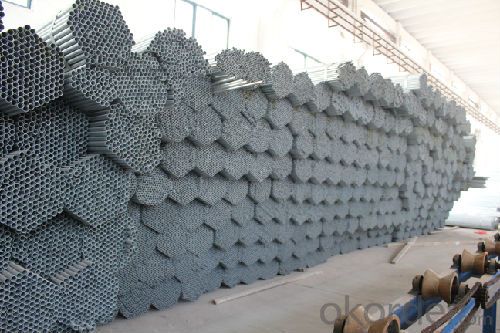
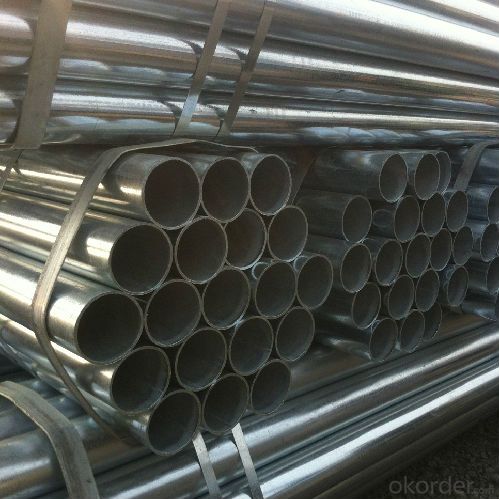
- Q: What are the safety precautions to follow while working with steel pipes?
- To ensure a safe working environment when dealing with steel pipes, it is crucial to adhere to specific safety measures. Consider the following key precautions: 1. Personal Protective Equipment (PPE): Always wear appropriate PPE, such as safety goggles, gloves, steel-toed boots, and a hard hat. This will shield you from potential hazards like falling objects, sharp edges, or flying particles. 2. Practice proper lifting methods: Given that steel pipes can be heavy and unwieldy, employ correct lifting techniques like bending your knees and utilizing your leg muscles to avoid straining your back or causing musculoskeletal injuries. 3. Secure the work area: Eliminate any clutter or obstacles in the work area that may present a tripping hazard. Ensure that the pipes are stored and secured adequately to prevent rolling or falling. 4. Exercise caution around sharp edges: Steel pipes often possess sharp edges that can cause cuts or punctures. Handle them with care and consider using protective covers or gloves to prevent injuries. 5. Utilize appropriate tools: Use the correct tools and equipment for cutting, welding, or manipulating steel pipes. Adhere to manufacturer instructions and guidelines to ensure safe usage. 6. Avoid working in confined spaces: Working in cramped areas presents significant risks. If necessary, ensure proper ventilation and adhere to confined space entry protocols to prevent asphyxiation or other hazards. 7. Adhere to proper welding procedures: When welding is involved, follow appropriate welding procedures and guarantee adequate ventilation in the workspace. Employ fire-resistant blankets or screens to protect nearby combustible materials. 8. Be cautious of hot surfaces: Steel pipes can become hot during welding or other processes. Utilize appropriate insulation or heat-resistant gloves to safeguard yourself against burns or heat-related injuries. 9. Establish effective communication: Establish clear channels of communication with colleagues, especially during tasks like lifting or moving heavy objects. Use hand signals or verbal communication to ensure everyone is on the same page and to prevent accidents. 10. Regularly inspect tools and equipment: Before commencing any task, inspect tools, equipment, and scaffolding for damages or defects. Report and replace any faulty equipment to prevent accidents. Always prioritize safety when working with steel pipes. By adhering to these precautions and using common sense, you can guarantee a safe working environment for yourself and your colleagues.
- Q: Are steel pipes fire-resistant?
- Indeed, steel pipes possess fire-resistant qualities. Being a non-combustible substance, steel does not ignite or aid in the propagation of flames. Steel pipes exhibit elevated melting points and can endure extreme temperatures, rendering them exceptionally fire-resistant. Consequently, they find widespread utilization in critical areas necessitating fire safety measures, including fire sprinkler systems, fire hydrant systems, and fire-resistant architectural frameworks. Moreover, the fire resistance capabilities of steel pipes are reinforced by their renowned robustness and resilience.
- Q: What is the difference between steel pipe and PVC pipe?
- Steel pipe is made from a combination of iron and carbon, giving it strength and durability. It is used for heavy-duty applications, such as plumbing and gas lines, as it can withstand high pressure and extreme temperature. On the other hand, PVC (polyvinyl chloride) pipe is a plastic pipe that is lightweight, easy to install, and resistant to corrosion and chemicals. It is commonly used for plumbing, irrigation, and drainage systems, but not suitable for high-pressure applications.
- Q: Can steel pipes be used for transporting hazardous materials?
- Yes, steel pipes can be used for transporting hazardous materials. Steel is known for its strength and durability, making it suitable for handling and containing hazardous substances. It is commonly used in various industries, such as oil and gas, chemical, and wastewater treatment, to transport materials that pose a potential risk to human health or the environment. Additionally, steel pipes can resist corrosion and high pressure, ensuring the safe transportation of hazardous materials.
- Q: Can steel pipes be used for gas transportation?
- Gas transportation can indeed employ steel pipes. Steel is frequently chosen as the material for gas pipelines due to its robustness, longevity, and resistance to corrosion. High pressures are withstood by steel pipes, rendering them suitable for conveying both natural gas and propane. Their ability to endure extreme temperatures further enhances their suitability for gas transportation across diverse settings. Moreover, steel pipes can be seamlessly welded together to create a continuous pipeline system. Nonetheless, it is crucial to guarantee that the steel pipes employed for gas transportation are adequately coated and shielded against corrosion to avert any leakage or pipeline harm.
- Q: How are steel pipes used in the oil and gas pipeline transportation?
- Steel pipes are used in oil and gas pipeline transportation due to their durability, strength, and resistance to corrosion. They are used to transport crude oil, natural gas, and other petroleum products over long distances. Steel pipes ensure the safe and efficient transfer of these resources from production sites to refineries and distribution centers, ensuring a reliable supply of energy for industries and consumers.
- Q: Are steel pipes suitable for underground gas distribution?
- Yes, steel pipes are suitable for underground gas distribution. Steel pipes are widely used in gas distribution systems due to their high strength, durability, and resistance to corrosion. They are able to withstand the pressure and stress of underground conditions, making them a reliable choice for transporting gas. Additionally, steel pipes have the advantage of being able to handle high temperatures and are resistant to fire, making them a safe option for underground gas distribution. However, it is important to ensure that the steel pipes used are properly coated and protected against corrosion to ensure their longevity and prevent any potential leaks or damage.
- Q: How are steel pipes used in the manufacturing of structural frameworks?
- Steel pipes are commonly used in the manufacturing of structural frameworks due to their strength, durability, and versatility. They provide a reliable means of connecting and supporting various components, allowing for the creation of robust and stable structures. Steel pipes are often used as columns, beams, and braces, providing essential support and stability to buildings, bridges, and other infrastructure projects. Additionally, steel pipes can be easily customized and fabricated to meet specific design requirements, making them a popular choice in the construction industry.
- Q: Can steel pipes be used for offshore applications?
- Yes, steel pipes can be used for offshore applications. Steel pipes are commonly used in offshore oil and gas drilling operations, as they have high strength, durability, and resistance to corrosion, which are essential qualities for withstanding harsh marine environments. Additionally, steel pipes can be easily welded and fabricated to meet specific offshore project requirements.
- Q: Are steel pipes resistant to chemicals?
- Yes, steel pipes are generally resistant to chemicals. However, their resistance may vary depending on the specific type of chemical and the grade of steel used. Some chemicals may cause corrosion or degradation of the steel over time, so it is important to consider the compatibility of the pipe material with the intended chemicals before use.
Send your message to us
Galvanized pipe America Standard ASTM A53 100g/200g hot dipped or pre-galvanized pipe
- Loading Port:
- Tianjin
- Payment Terms:
- TT or LC
- Min Order Qty:
- 40 m.t.
- Supply Capability:
- 9000 m.t./month
OKorder Service Pledge
OKorder Financial Service
Similar products
Hot products
Hot Searches
Related keywords
